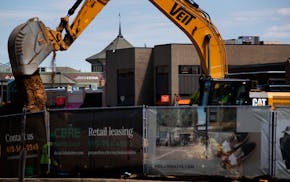In an effort to cover the cost of several large but routine improvements to the city's water and sanitary sewer infrastructure in the coming years, Lakeville will be raising water and sewer rates for residents and businesses each year over the next decade.
After reviewing an analysis of its current sewer and water funds prepared by Springsted Inc., the city chose a scenario that would raise water rates by 4.25 percent annually, beginning in 2014 and extending through 2023.
Sanitary sewer rates will go up by 6.35 percent from 2014-16, 6 percent in 2017, 2.9 percent in 2018 and 2.5 percent each year from 2019-2023.
The city will also use debt financing over nine years to pay for the projects, including $15.8 million for the water fund and $2.2 million for the sewer fund.
For an average household using 18,000 gallons of water a quarter, the sewage, water and streetlight bill would increase by $5.21 per quarter next year, or about $20 a year, to $102.37. By 2022, the rate per quarter would be about $119.73, according to the Springsted report.
Some of the projects — such as replacing old water-main pipes — need to be completed simply because of the city's age.
"Replacement of water systems in a young town like Lakeville is somewhat of a new pressure for us," said Steve Mielke, city administrator. The city has begun making such replacements over the past five to 10 years, he said.
Other capital expenditures include updating lift stations and building a new water tower in the coming years, he said.
The rate increases will also allow the city to reverse the recent trend of consistently negative net income in the water and sewer funds since 2009, the Springsted report said.
A final factor in raising rates is related to the cost of having effluent, or liquid waste, treated by the Metropolitan Council's Environmental Services division (MCES). MCES rates will soon be rising by 6.8 percent, which is above the inflation rate, Mielke said.
Since every metro-area city uses MCES' services, every city's sewage costs will be going up and "they're all going to feel that same pressure," he said.
Dennis Feller, the city's finance director, emphasized that Lakeville's water rates will "continue to be on the low end" among cities in the metro area, even after the increases. Comparatively, the new sewer rates will keep Lakeville "in the middle of the pack," Feller said.
Planning ahead allows Lakeville to avoid saddling residents and businesses with sudden increases that "really get people's attention," Mielke said.
Lakeville hasn't raised its rates for four years, Mielke added. "I will say this: It's really important that cities annually look at these capital and operating costs and not get themselves behind," he said.
In Belle Plaine, for instance, the city is proposing more dramatic increases, including raising water rates by 36 percent and sewer rates by 32 percent, beginning Jan. 1.
A report by a consulting firm said the reason for the large increases is that money coming in hasn't covered Belle Plaine's water and sewer operational expenses for three years.
Erin Adler • 952-746-3283

Shop the curbs for free on 'Trash to Treasure Day' in White Bear Lake

Lacrosse lists: 21 top players and the school that's No. 1 for boys and girls

Will 'shotgun only' zone for deer in southern Minnesota be abolished?
One killed in head-on crash in Coon Rapids

